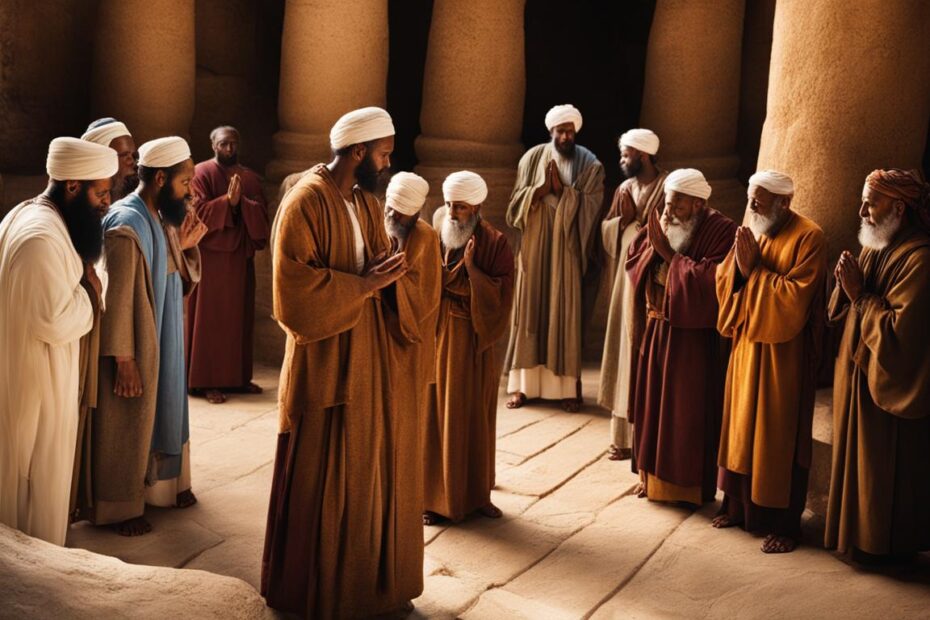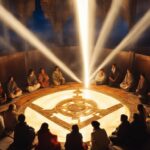Ancient Israel had a rich tradition of intercessory prayer, as seen in the biblical accounts of the Old Testament. The Israelites believed in the power of prayer to communicate with God and seek His intervention on their behalf. These intercession practices were an integral part of their religious traditions and played a significant role in their spiritual lives.
Key Takeaways
- Ancient Israel had a strong belief in the power of intercessory prayer and its ability to communicate with God.
- The Israelites practiced various forms of intercession, including individual prayers, communal prayers, and rituals performed by priests.
- The prophets played a crucial role in intercession, serving as intermediaries between God and the people.
- Repentance and collective prayer were important aspects of intercession in ancient Israel.
- Intercession practices in ancient Israel teach valuable lessons about faith, prayer, and the importance of seeking God’s guidance.
Understanding Intercessory Prayer in Ancient Israel
Ancient Israel had a deeply ingrained culture of intercessory prayer, which played a significant role in their religious practices. The Israelites believed in the power of prayer to communicate with God and seek His intervention on their behalf. Intercessory prayer in ancient Israel involved individuals or groups interceding on behalf of others, seeking God’s mercy, guidance, and intervention in various circumstances.
The ancient Jewish prayer customs emphasized the belief that through their prayers, the Israelites could bring their needs and the needs of others before God and receive His favor and blessings. This form of prayer was seen as a way to bridge the gap between humanity and the divine, a means of seeking God’s divine intervention in their lives. It was an integral part of their spiritual lives, highlighting their deep faith and trust in God’s power and love.
In ancient Israel, intercessory prayer took various forms. Individual prayers were offered by individuals seeking God’s intervention in their personal lives. Communal prayers involved the entire community coming together to seek God’s guidance and favor for the nation as a whole. Additionally, formal rituals performed by priests were part of the intercession practices, conducted at the tabernacle or later at the temple. These rituals were designed to create a sacred atmosphere and enhance the effectiveness of intercession.
Intercessory prayer in ancient Israel is a testament to the Israelites’ profound understanding of the importance of seeking God’s intervention and guidance. It reveals their unwavering faith and their belief in the power of prayer to connect with the divine. Understanding these ancient intercession practices can inspire and deepen our own prayer lives, reminding us of the significance of seeking God’s intervention and blessings in our lives and the lives of others.
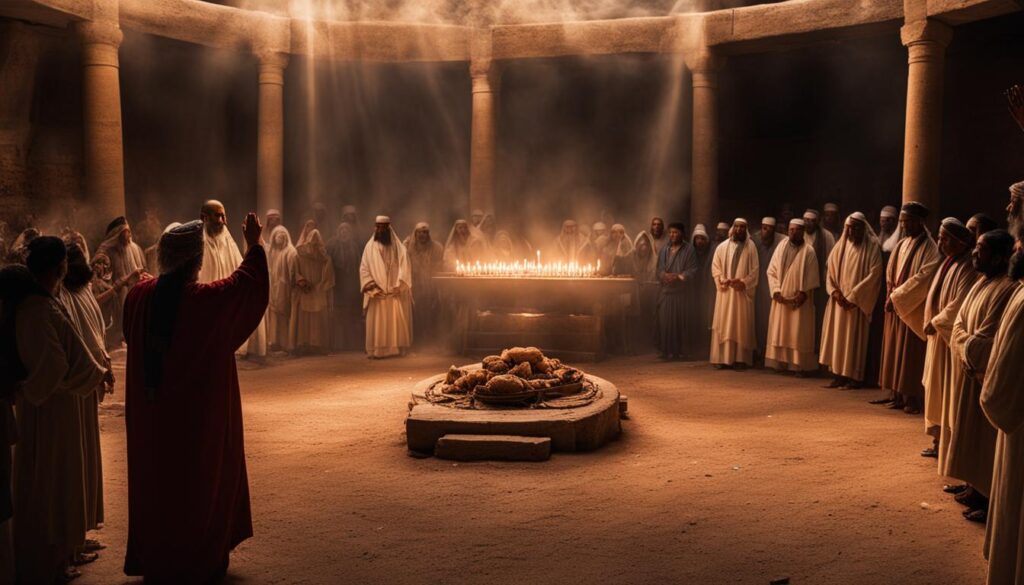
The Role of Prophets in Intercession
In ancient Israel, the prophets played a critical role in the practice of intercession. They were regarded as intermediaries between God and the people, acting as spiritual leaders and guides. Through their unique connection with the divine, prophets would intercede on behalf of the nation or individuals, seeking God’s intervention, guidance, and protection.
The prophets’ intercessory prayers were seen as powerful and effective in bringing about God’s deliverance and fulfillment of His divine purposes. They would fervently pray, seeking God’s wisdom and direction, and relay His messages and warnings to the people. The prophets’ prayers demonstrated their deep faith and trust in God’s sovereignty and His willingness to hear and answer their cries for help.
The prophets were not only messengers of God’s word but also advocates for the people’s needs. Their intercessory prayers served as a channel through which the people could approach God and find comfort, guidance, and hope.
Throughout the biblical accounts, we see numerous examples of prophets engaging in intercession. Moses interceded on behalf of the Israelites, pleading with God to spare them from His wrath and to show mercy. The prophet Samuel interceded for the nation during times of crisis, seeking God’s guidance in battle and leadership. The prophet Elijah fervently prayed for rain, seeking God’s intervention to end a severe drought.
| Prophet | Intercessory Action |
|---|---|
| Moses | Interceded for the Israelites, pleading for God’s mercy |
| Samuel | Interceded for guidance in battle and leadership |
| Elijah | Fervently prayed for rain to end a severe drought |
The role of the prophets in intercession highlights the importance of seeking God’s intervention and guidance in times of need. Their example teaches us the power of prayer, faith, and reliance on God’s wisdom and sovereignty. Just as the prophets faithfully interceded for the people of ancient Israel, we too can approach God in prayer, knowing that He hears and responds to our deepest needs and desires.
Prayer Traditions in Ancient Israel: A Window into Spiritual Devotion
In ancient Israel, prayer was a deeply ingrained part of the Israelites’ religious traditions and spiritual lives. Their prayer traditions encompassed a variety of forms, from individual prayers to communal rituals, all seeking to connect with God and seek His guidance, protection, and blessings. Through their prayers, the Israelites expressed their faith, hope, and devotion, believing in the power of intercession to bring about divine intervention.
Individual prayers were an integral part of Israelite prayer traditions. These personal prayers allowed individuals to pour out their hearts to God, expressing their innermost desires, concerns, and gratitude. The practice of individual prayer provided a direct and personal connection between the individual and God, fostering a deep sense of faith and trust.
Communal prayers were also highly valued in ancient Israel. Gathering together at the tabernacle or later at the temple, the Israelites would join in collective prayer, uniting their voices and hearts in seeking God’s favor for the nation, their leaders, and specific needs. This communal intercession fostered a sense of unity and shared faith, reinforcing the belief that their prayers carried greater weight and effectiveness when offered together.
The Role of Formal Rituals in Israelite Prayers
Formal rituals performed by priests were another significant aspect of prayer traditions in ancient Israel. The priests were entrusted with the responsibility of leading the people in structured worship, offering sacrifices, and performing ceremonial duties. These rituals, accompanied by specific gestures, incense, and sacrifices, were believed to create a sacred atmosphere and enhance the effectiveness of intercessory prayer.
As the Israelites sought forgiveness, guidance, and blessings from God, these formal rituals served as powerful symbols of their faith and devotion. Through their participation in these rituals, they were able to tangibly express their prayers and draw closer to God, recognizing His sovereignty and their dependence on Him.
Overall, the prayer traditions of ancient Israel provide us with valuable insights into the spiritual devotion and fervent faith of the Israelites. Whether through individual prayers, communal intercession, or formal rituals, the Israelites sought to establish a deep connection with God, believing in His power to answer their prayers. These prayer traditions continue to inspire and guide us today, reminding us of the importance of faith, unity, and a humble heart in our own prayer lives.
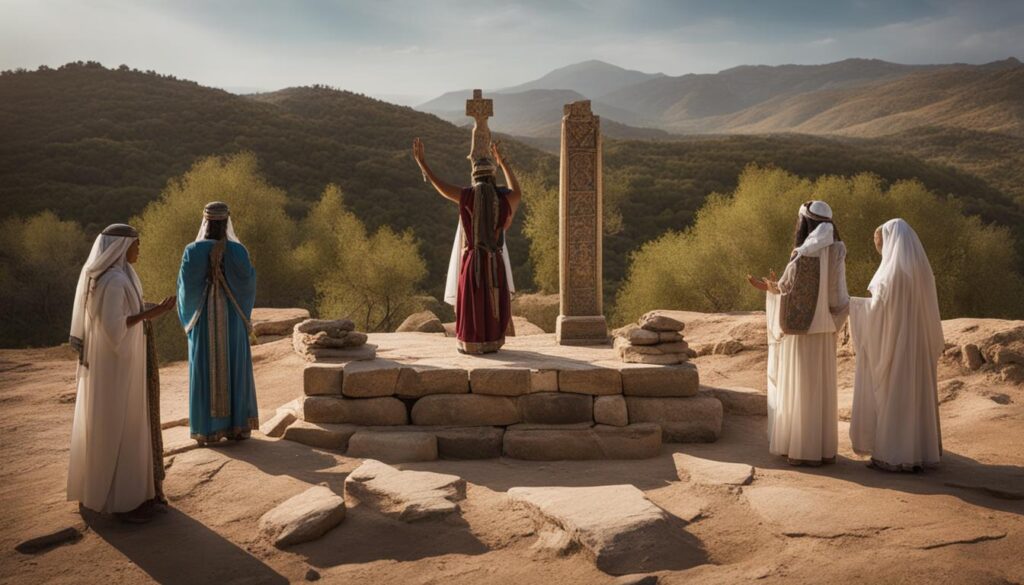
The Importance of Repentance in Intercession
Repentance played a crucial role in intercession in ancient Israel. The Israelites understood that their prayers would only be heard by God if they approached Him with genuine remorse and a desire to turn away from their sins. The act of repentance was seen as a prerequisite for receiving God’s forgiveness and mercy.
Prayer for forgiveness was a common practice among the Israelites. They would express their heartfelt contrition, confessing their sins and seeking God’s forgiveness. This act of humility and repentance was a way for them to demonstrate their faith and reliance on God’s grace. It was through this repentant posture that they believed their prayers would be accepted and their intercession on behalf of others would be effective.
“Create in me a clean heart, O God, and renew a right spirit within me.”
– Psalm 51:10
The psalmist’s plea for a clean heart exemplifies the deep understanding of the Israelites regarding the importance of repentance in intercession. They recognized that without a sincere repentant heart, their prayers would lack the power and intimacy needed to connect with God.
| Key Lessons | Explanation |
|---|---|
| Repentance as a prerequisite | The Israelites believed that genuine repentance was necessary for effective intercession and receiving God’s forgiveness. |
| Faith and reliance on God | Repentance demonstrated the Israelites’ trust in God’s grace and their willingness to turn away from sinful behavior. |
| Impact on intercessory prayers | Through repentance, the Israelites believed their prayers would carry more weight and be heard by God. |
By understanding the importance of repentance in intercession, we can apply this lesson to our own prayer lives. Just as the Israelites sought God’s forgiveness and turned away from sin, we too can approach God with humble hearts, acknowledging our need for His grace. Repentance opens the door for our prayers to be heard and enables us to intercede effectively on behalf of others.

The Power of Collective Intercession
In ancient Israel, collective intercession was highly valued and considered a powerful practice. The Israelites believed that when they came together as a community to pray, their prayers would carry more weight and have a greater impact. It was a way for the people to unite their voices, hearts, and intentions, seeking God’s intervention for the nation, their leaders, and specific needs.
Collective intercession often took place at the tabernacle or later at the temple, where the Israelites would gather as a community to offer communal prayers. This act of coming together in prayer fostered a sense of unity and strengthened the faith of the people. It was a reminder that they were not alone in their struggles and that they could find solace and support in the company of others.
During collective intercession, the Israelites would lift up their petitions, praises, and thanksgivings as a community. They recognized the power of their collective voices and the impact it could have on their relationship with God. Through communal prayer, they sought His guidance, protection, and blessings, trusting that their prayers would be heard and answered.
The Power of Unity in Communal Intercession
Communal intercession served as a reminder of the importance of unity among the Israelites. It emphasized the interconnectedness of their lives and the shared responsibility they had for one another. By coming together in prayer, they demonstrated their commitment to supporting and uplifting each other, both in times of joy and in times of struggle.
Collective intercession also had a profound effect on the spiritual growth of the community. It created an environment where individuals could learn from each other’s faith, experiences, and perspectives. Through shared prayers, they could find inspiration, encouragement, and a renewed sense of purpose in their relationship with God.
The power of collective intercession transcends time and is still relevant today. As we come together in prayer with others, whether in our places of worship or in virtual communities, we tap into the strength of unity and experience the transformative power of communal intercession. It is a practice that reminds us of the power of prayer and the importance of supporting one another on our spiritual journeys.
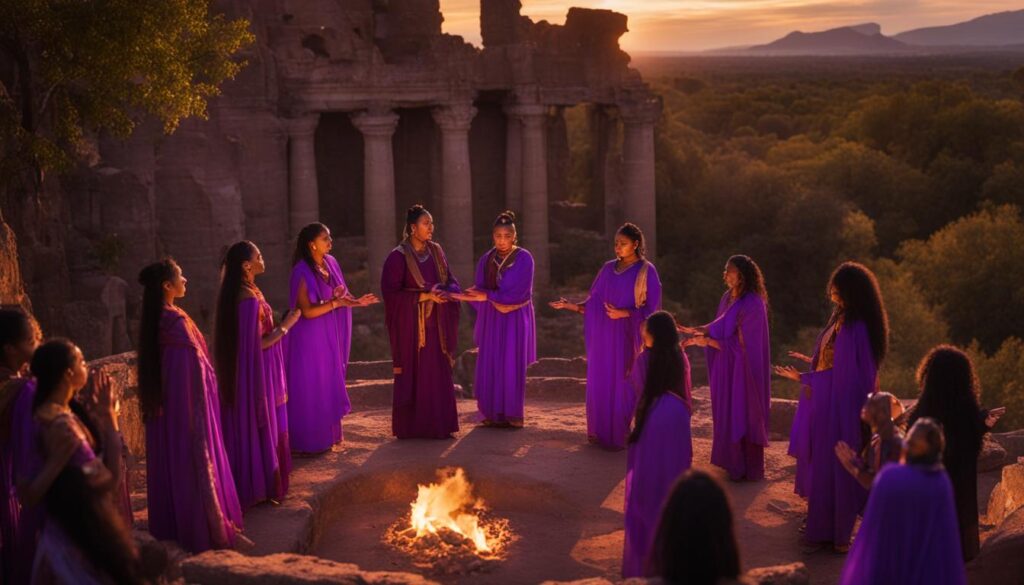
The Power of Collective Intercession
| Benefits of Collective Intercession | Examples |
|---|---|
|
|
Symbols and Rituals in Intercessory Prayer
Intercessory prayer in ancient Israel was accompanied by various symbols and rituals, which served as powerful means of expression and connection with the divine. These symbols and rituals enhanced the effectiveness of prayers and created a sacred atmosphere conducive to communication with God.
One of the significant symbols used in intercessory prayer was incense. The burning of incense represented the ascent of prayers to heaven, symbolizing the Israelites’ desire for their petitions to reach the ears of God. The sweet fragrance of incense also served as a sensory reminder of God’s presence and the sanctity of the moment.
Additionally, rituals played a pivotal role in intercession. The priests would perform specific actions, such as offering sacrifices, to demonstrate the Israelites’ devotion and seek God’s favor. These rituals were performed with precision and reverence, emphasizing the sacred nature of intercession and the importance of approaching God with humility and sincerity.
| Ritual | Purpose |
|---|---|
| Offering animal sacrifices | Seeking forgiveness and atonement for sins |
| Sprinkling of blood | Purification and consecration |
| Waving of hands | Invoking God’s blessing and favor |
| Bowing or kneeling | Expressing reverence and submission to God |
These symbols and rituals served as powerful reminders of the Israelites’ dependence on God and their desire to seek His intervention through prayer. They created a profound sense of awe and reverence, helping the people to focus their hearts and minds on their spiritual connection with the divine.
Reflection on Symbols and Rituals
The symbols and rituals used in intercessory prayer in ancient Israel provide us with valuable insights into the power and significance of physical expressions of faith. They demonstrate that prayer is not merely an intellectual exercise but a holistic experience that engages the senses and nurtures a deeper connection with God.
- The use of symbols, such as incense, reminds us of the importance of offering our prayers with sincerity, humility, and a desire for spiritual ascent.
- The rituals performed by the priests teach us the value of approaching God with reverence, acknowledging our need for forgiveness, purification, and divine favor.
- The gestures of waving hands, bowing, and kneeling convey our surrender and submission to God, acknowledging His sovereignty and authority over our lives.
By incorporating these elements into our own prayer practices, we can deepen our experience of intercession and cultivate a greater sense of connection with the divine. The symbols and rituals of ancient Israel continue to inspire and guide us, reminding us that prayer is not just a request for God’s intervention but a transformative encounter with His presence.
Lessons from Ancient Israel Intercession Practices
The intercession practices of ancient Israel provide us with valuable lessons about faith and prayer in biblical times. They offer insights into the deep spiritual traditions of the Israelites and their unwavering belief in the power of intercessory prayer. By studying these practices, we can gain a deeper understanding of how to approach our own prayers and seek God’s intervention in our lives today.
The Power of Faith
A key lesson we can learn from ancient Israel’s intercession practices is the power of faith. The Israelites demonstrated unwavering trust in God’s ability to answer their prayers and intervene on their behalf. They approached Him with humility and reverence, knowing that He had the power to bring about change in their lives and in their nation. This strong faith is an inspiration for us to cultivate a similar conviction in our own prayers, trusting that God hears us and is able to work in miraculous ways.
The Importance of Persistence
Ancient Israel’s intercession practices also teach us the importance of persistence in prayer. The Israelites did not give up easily but continued to seek God’s intervention, even in times of difficulty and despair. They understood that prayers were not always answered immediately and that it required steadfastness to persevere in seeking God’s guidance and help. This lesson reminds us to remain persistent in our own prayers, trusting that God’s timing is perfect and that He will answer in His own way and time.
The Power of Communal Prayer
One of the most striking aspects of ancient Israel’s intercession practices was their emphasis on communal prayer. The Israelites recognized the power of coming together as a community to seek God’s intervention and blessings. They understood that there was strength in unity and that the prayers of many were more powerful than individual prayers. This lesson encourages us to prioritize communal prayer in our own lives, recognizing the importance of praying together with others and supporting one another in our spiritual journeys.
| Lesson | Description |
|---|---|
| The Power of Faith | Acknowledge the power of faith in our prayers, trusting that God hears and answers. |
| The Importance of Persistence | Understand the need for persistence in prayer, not giving up easily but continuing to seek God’s intervention. |
| The Power of Communal Prayer | Recognize the strength and effectiveness of praying together as a community, supporting one another in our spiritual journeys. |
The Continuation of Intercession Practices Today
Intercession, although rooted in ancient traditions, continues to be a vital practice in modern times. People from various religious backgrounds engage in intercessory prayer as a way to seek God’s intervention, guidance, and blessings. This timeless practice transcends cultural and religious boundaries, connecting individuals and communities in a shared desire to pray for the well-being of others.
The contemporary prayer traditions of intercession reflect the deep-seated belief in the power of collective prayer. In a world often marked by division and discord, intercession offers a means of fostering unity, compassion, and empathy. By interceding on behalf of others, individuals exercise selflessness and demonstrate care for the needs and struggles of their fellow human beings.
Intercession is not solely about asking for personal favors; it is about lifting others up in prayer and seeking God’s intervention for their benefit.
Modern intercession practices also embrace technological advancements, with digital platforms providing opportunities for global intercession movements. Online prayer groups, forums, and social media networks enable individuals from different parts of the world to come together, sharing their prayer needs and offering support to one another. Through the power of virtual connectivity, intercession can reach greater heights, uniting people across continents in common prayer.
Table: Comparing Ancient and Contemporary Intercession Practices
| Aspect | Ancient Intercession Practices | Contemporary Intercession Practices |
|---|---|---|
| Focus | Primarily on communal and individual prayer | Expanded to include global connectedness and virtual prayer communities |
| Medium | Tabernacle or temple gatherings | Online platforms, social media networks, and virtual prayer groups |
| Scope | Nation and community-centric | Global and inclusive, embracing diversity |
| Outreach | Primarily within the immediate religious community | Extended to a wider network of believers globally |
As the world continues to evolve, the essence of intercession remains steadfast. It is a practice that transcends time and space, allowing individuals and communities to seek divine intervention in the lives of others. Whether in ancient Israel or contemporary society, the power of intercession lies in its ability to connect people, cultivate empathy, and draw individuals closer to their faith.
Conclusion
In conclusion, the intercession practices of ancient Israel provide us with profound insights into the power of prayer and the deep faith of the Israelite people. These practices, recorded in the Old Testament, reveal the significance of seeking God’s guidance, intervention, and favor through intercessory prayers.
While the specific customs and rituals may differ in our modern context, the principles and concepts behind intercession are timeless. The lessons we can learn from the faith and devotion of ancient Israel continue to hold relevance and inspiration for us today.
By embracing the spirit of intercession – rooted in faith, humility, and a desire to pray for others – we can cultivate a deeper connection with God and foster unity within our communities. The intercession practices of ancient Israel remind us of the importance of prayer, repentance, and communal worship in seeking God’s guidance and intervention in our lives.
Let us draw inspiration from the devotion and spiritual traditions of ancient Israel as we continue our own journeys of faith. May we deepen our understanding and practice of intercessory prayer, bringing us closer to God and opening our hearts to compassion and unity with others.
FAQ
What were the intercession practices in ancient Israel?
Intercession in ancient Israel involved individuals or groups praying on behalf of others to seek God’s intervention and guidance.
Who were the prophets in ancient Israel and what was their role in intercession?
The prophets were seen as intermediaries between God and the people, and they often interceded on behalf of the nation or specific individuals, praying, seeking God’s guidance, and delivering His messages.
What forms of intercession were practiced in ancient Israel?
Forms of intercession included individual prayers, communal prayers, and formal rituals performed by priests at the tabernacle or temple to seek forgiveness, guidance, protection, and blessings from God.
How important was repentance in intercession in ancient Israel?
Repentance was crucial in intercession, as the Israelites believed sincere repentance and turning away from sin were necessary for their prayers to be heard by God. They would offer prayers of confession and seek forgiveness for their sins as individuals and as a community.
Why was collective intercession valued in ancient Israel?
Collective intercession was highly valued, as the Israelites believed that when they gathered as a community to pray, their prayers carried more weight and were more effective, particularly when seeking God’s intervention for the nation, their leaders, and specific needs.
Did symbols and rituals play a role in intercessory prayer in ancient Israel?
Yes, symbols and rituals were used in intercessory prayer to enhance its effectiveness and create a sacred atmosphere. The use of incense, sacrifices, and specific gestures during prayer helped the Israelites focus their hearts and minds on God.
What lessons can we learn from ancient Israel intercession practices?
Ancient Israel intercession practices teach us the importance of seeking God’s guidance, the power of repentance, communal prayer, and the significance of symbols and rituals in prayer. They deepen our understanding and practice of intercession.
Do intercession practices continue today?
Yes, intercession practices continue in many religious traditions today, with individuals and communities seeking God’s intervention and guidance through prayer.


